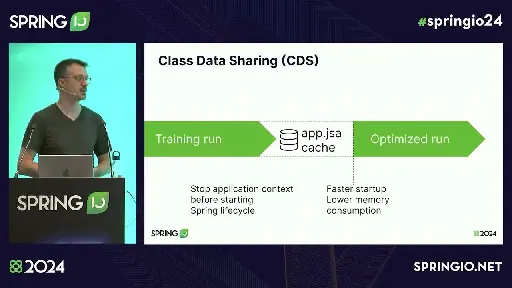
This article is part of a series on (European) innovation and capabilities. This is a lightly edited transcript of my presentation today at the ACCSS/NCSC/Surf seminar ‘Cyber Security and Society’. I want to thank the organizers for inviting me to their conference & giving me a great opportunity to ...

Explore whether adding the K8S CPU limit will degrade service performance.
Explore whether adding the K8S CPU limit will degrade service performance.
tl;dr: Having swap is a reasonably important part of a well functioning system. Without it, sane memory management becomes harder to achieve.

To be clear, I don't blame the poster of this comment at all for the content of their post – this is accepted as "common knowledge" by a lot of Linux sysadmins and is probably one of the most likely things that you will hear from one if you ask them to talk about swap. It is unfortunately also, however, a misunderstanding of the purpose and use of swap, especially on modern systems.
I'm not sure if you understand what swap actually is, because even machines with 1Tb of RAM have swap partitions, just in case read this post from a developer working on swap module in Linux https://chrisdown.name/2018/01/02/in-defence-of-swap.html

YouTube Video
Click to view this content.

YouTube Video
Click to view this content.
This document presents new time-based UUID formats which are suited for use as a database key. A common case for modern applications is to create a unique identifier for use as a primary key in a database table. This identifier usually implements an embedded timestamp th...
This document presents new time-based UUID formats which are suited for use as a database key.
This specification defines the UUIDs (Universally Unique IDentifiers) and the UUID Uniform Resource Name (URN) namespace. UUIDs are also known as GUIDs (Globally Unique IDentifiers). A UUID is 128 bits long and is intended to guarantee uniqueness across space and time. UUIDs were originally used in...
This specification defines the UUIDs (Universally Unique IDentifiers) and the UUID Uniform Resource Name (URN) namespace. UUIDs are also known as GUIDs (Globally Unique IDentifiers). A UUID is 128 bits long and is intended to guarantee uniqueness across space and time. UUIDs were originally used in the Apollo Network Computing System and later in the Open Software Foundation's (OSF) Distributed Computing Environment (DCE), and then in Microsoft Windows platforms.
Even though we often hear terms like L1, L2, cache block size, etc., most programmers have a limited understanding of what cache really is. This is a beginner-friendly primer on how cache works.

Even though we often hear terms like L1, L2, cache block size, etc., most programmers have a limited understanding of what cache really is. This is a beginner-friendly primer on how cache works.

In this post, I look at Virtual Threads and if they are a silver bullet for blocking tasks.
The Linux kernel uses the CPU default scheduler, CFS,
Linux 6.6 (which recently landed on Debian) changed the scheduled to EEVDF, which is pretty widely criticized for poor tuning. 100% busy which means the scheduler is doing good job. If the CPU was idle and compilation was slow, than we would look into task scheduling and scheduling of blocking operations.
EDIT: Tried nice -n +19, still lags my other programs.
yea, this is wrong way of doing things. You should have better results with CPU-pinning. Increasing priority for YOUR threads that interact all the time with disk io, memory caches and display IO is the wrong end of the stick. You still need to display compilation progress, warnings, access IO.
There's no way of knowing why your system is so slow without profiling it first. Taking any advice from here or elsewhere without telling us first what your machine is doing is missing the point. You need to find out what the problem is and report it at the source.
The CPU is already 100% busy, so changing number of compilation jobs won't help, CPU can't go faster than 100%.
This blog introduces three mechanisms to investigate the execution time of a Maven build. Having a reliable way to measure build execution time can help identify bottlenecks. This in turn helps making effective improvements, thereby contributing to higher developer productivity. Find out how to effe...


YouTube Video
Click to view this content.
Yeah this survey is super inappropriate and offensive. Please do not ask such personal questions.
Did you notice that more inappropriate questions appear and disappear based on your previous answers?
Explore how our AI-powered tool is revolutionizing flamegraph interpretation

https://openjdk.org/projects/leyden. Contribute to openjdk/leyden development by creating an account on GitHub.

This is a lightly edited transcript of my presentation today at the ACCSS/NCSC/Surf seminar ‘Cyber Security and Society’. I want to thank the organizers for inviting me to their conference & giving me a great opportunity to talk about something I worry about a lot. Here are the original slides with ...

Find out how to use perf, a built-in Linux profiler, to analyze the performance of Java applications.
Learn about two approaches to compiling Java applications, their benefits for performance and drawbacks.
ULL trading firms go to a lot of trouble to get their servers and switches within the same buildings as the exchanges they trade with to reduce latency. Some firms don’t even use layer 1 switches to be competitive.
Updating Kubernetes pod resources in-place is a new way to optimize your k8s cluster without disruptions or restarts!

Old issue, so why post it now make it sound like MS demands something?
Opened 11 months ago Last modified 11 months ago
It's a regression, so ffmpeg should fix a regression.
It really depends on where you set the limit on what ORM is, JOOQ is kind of a thing you're looking for.
Nothing changed, openapi-genereator
I completely missed that user namespaces were added in 1.25. It will make homelabs much easier and safer with little effort.
Support user namespaces in pods (KEP-127)
User namespaces is a Linux-only feature that better isolates pods to prevent or mitigate several CVEs rated high/critical, including CVE-2024-21626, published in January 2024. In Kubernetes 1.30, support for user namespaces is migrating to beta and now supports pods with and without volumes, custom UID/GID ranges, and more!
https://kubernetes.io/docs/concepts/workloads/pods/user-namespaces/
Just not in Java…
I think you're biased against Java. Amazon was started in C/C++ and Java J2EE during times when to configure a webserver required writing like 300 lines of XML just to handle cookies, browser cache and a login page. Until recently BMW had their own JRE implementation. It's not a secret that simcards, including these in Tesla cars run JavaCard too, even government issues sim cards in EU have to run Java Card, not C++. Everything was always fine with Java until ECMA Script appeared and made people iterate on software versions faster. New programming languages and team organisation methodologies left some programming languages in the dark, but this included C# too. All are quickly catching up. If Java was so bad, it wouldn't be here with us today, like Perl.
There are two schools:
- the best stack is the one you know best
- the best stack is the one designed for the job
Remember that Google was written in Python and Java. Facebook in PHP. iOS in Objective-C. GitHub in Ruby on Rails.
After doing it for 15 years, I must be good at it and everything should be easy.
hidethepainharold.jpg
So while I'm myself struggling to fully understand what this is, it conceptually like it's a blockchain on syncthing, where even if you subscribe to a read only share, you can locally delete what you don't want to keep. So technically you could make bitorrent to behave like syncthing with search function for contacts you already know.
I did the same initially and run out of memory at 60Gb...
Big O notation is useless for smaller sets of data. Sometimes it’s worse than useless, it’s misguiding.
I don't agree that it's useless or misguiding. The smaller dataset, the less important it is, but it makes massive difference how the rest of the algorithm will be working and changing context around it.
Let's say that you need to sort 64 ints, in a code that starts our operating system. You need to sort it once per boot, and you boot less frequently than once per day, in fact you know instances of the OS that have 14 years of uptime, so it doesn't matter at all right? Welp. Now your OS is used by a big cloud provider and they use that code to boot the kernel 13 billions times per day. The context changed, time passed by, your silly bubble sort that doesn't matter on small numbers is still there.
Heres the blog post about the change dated in June this year
Half year too late for that outrage anyway :)
